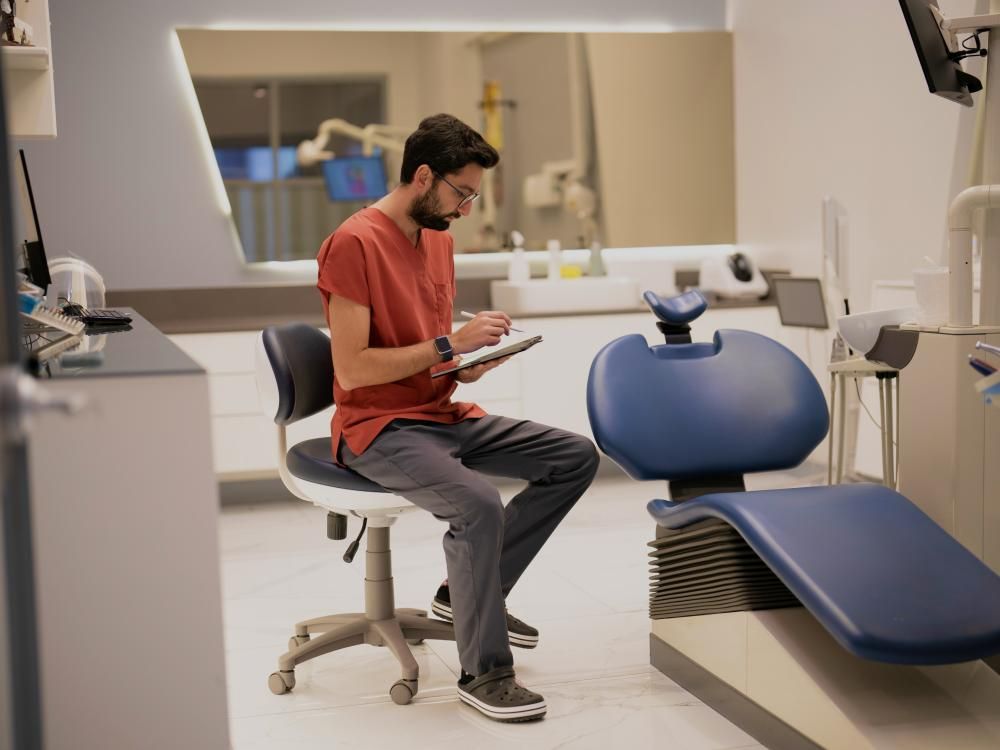
Healthcare CRM: capabilities, benefits & top platforms
July 9, 2024
- Home
- Healthcare software development solutions & services
- Healthcare CRM

by Sergey Ivanov,
Head of Healthcare Center of Excellence
Healthcare CRM is an industry-specific CRM solution that helps medical service providers securely store and manage patient information, automate sales and marketing processes, and foster collaboration between care and admin teams, leading to improved patient acquisition, engagement, and experience. Itransition helps healthcare organizations of all sizes and specialties implement, optimize, support, and modernize CRM solutions according to their unique needs, security requirements, and region-specific regulations.
Healthcare CRM system market statistics
the expected CAGR of the healthcare CRM market from 2021 to 2027
Mordor Intelligence
the estimated size of the global healthcare CRM tools market in 2030
Allied Market Research
of CRM software solutions’ end users are healthcare providers
Grand View Research
Core features of medical CRM software
Sales & marketing automation
Patient relationship management
Document management
Task management & collaboration
Reporting & analytics
Looking for particular healthcare CRM features?
Types of healthcare CRM
Before implementing a customer relationship management system, healthcare providers should decide whether they need an off-the-shelf or a custom-made solution and how it will be deployed. The key differences between the off-the-shelf and custom CRM software lie in the system’s flexibility, implementation timeline, and cost, while the cloud and on-premise systems differ in hosting, maintenance, and accessibility.
Off-the-shelf vs custom
Off-the-shelf
Custom
Flexibility
Flexibility
Is less flexible in meeting the specific requirements of a particular organization.
Is fully tailored to meet organizations’ specific needs.
Implementation time
Implementation time
Can be implemented relatively quickly, as it’s already built and only requires configuration and/or customization.
Requires time for development and thus takes longer to implement.
Cost
Cost
Varies depending on the platform, but usually requires less initial investment.
Is more expensive upfront than off-the-shelf solutions.
Cloud-based vs on-premise
Cloud-based
On-premise
Hosting & maintenance
Hosting & maintenance
Patient and operational data is stored on the solution provider’s servers, unless it is a private cloud-based CRM. The vendor is responsible for SaaS software's maintenance, upgrades, and security.
Patient and operational data is stored on the organization’s servers. The organization is in charge of the system’s backups, data security, etc.
Accessibility
Accessibility
Can be accessed from any device with an internet connection.
Can only be accessed from devices connected to the organization's internal network.
Cost
Cost
Is usually sold on a subscription basis, which means lower upfront costs and higher TCO in the long run.
Is typically sold as a one-time license fee, which means higher upfront costs but lower ongoing expenses.
Best healthcare CRM software options
The market for healthcare CRM systems is reasonably competitive. Multiple vendors provide medical CRM solutions for organizations specializing in healthcare and life sciences, with products from Microsoft, Salesforce, Odoo, Pegasystems, and Leadsquared being the most popular.
Scheme title: Healthcare CRM market concentration
Data source: mordorintelligence.com — Healthcare CRM market size & share analysis — growth trends & forecasts (2023–2028)
Microsoft Cloud for Healthcare
Key differentiators
- Microsoft Cloud for Healthcare centralizes all crucial clinical and business data in one place, enabling healthcare providers to quickly and efficiently derive valuable insight into patients’ health, behavior, and preferences.
- Microsoft Cloud for Healthcare supports intelligent chatbot-powered data acquisition.
- This system’s capabilities facilitate dynamic appointment scheduling and task distribution for healthcare professionals based on the facilities’ real-time occupancy rates, personnel schedules, and other variables.
- MS Cloud for Healthcare allows sales and marketing specialists to create campaigns based on the patients’ demand pattern, personalizing customer experience and enhancing their loyalty.
Limitations
- Has multiple deployment requirements, therefore must be implemented by experts.
- Microsoft Cloud for Healthcare implemented in the same IT environment with Dynamics 365 healthcare accelerator can lead to issues with user experience.
- This system is complex, especially when customized with the help of additional modules or integrated with other software, which makes it tricky for new users to learn.
Pricing
- The number and type of components included in the Microsoft Cloud for Healthcare solution depend on the company’s requirements, and constitute the final cost of the solution. Each MS Cloud for Healthcare component like Dynamics 365 requires separate licensing.
- A stand-alone Dynamic 365 Sales Professional application starts at $65 per user per month.
Salesforce
Key differentiators
- Advanced analytics and reporting features enable healthcare organizations to gain insights into their operations and patient care.
- Allows healthcare organizations to customize workflows based on their specific needs.
- A large ecosystem of third-party apps and integrations enables healthcare organizations to extend the functionality of their CRM platform.
Limitations
- Can be more expensive than other CRM solutions on the market.
- Salesforce Health Cloud is complex to set up and use, which can be challenging for healthcare organizations lacking the required expertise.
Pricing
Starting from $325 per user/month for the Enterprise edition. The implementation price varies depending on multiple factors, such as functional scope and the number and type of integrations required to implement the solution in the particular environment successfully.
Odoo CRM
Key differentiators
- Customizable workflows based on organizations’ specific needs enable providers to manage their operations more efficiently.
- Odoo’s modular structure helps healthcare organizations streamline their operations without investing in capabilities they don’t need.
- Odoo’s free version makes it a good option for healthcare organizations with limited budgets.
Limitations
- This healthcare CRM platform’s basic functionality doesn’t cover the business requirements of large organizations.
- While Odoo’s customization potential is the highest among its competitors, its implementation requires the assistance of technical experts.
- Odoo doesn’t offer the same level of support as some larger CRM vendors.
Pricing
Using one online Odoo application is free. Other plans include all applications, starting at $24.90 per user per month if billed annually.
Pega
Key differentiators
- Pega offers AI-powered tools, such as predictive analytics and decision-making algorithms, designed for medical settings.
- Pega-based medical CRM can be easily integrated with other healthcare-related solutions, such as EHRs and claims management systems.
Limitations
- Pega is among the most expensive platforms for creating healthcare CRM solutions.
- Some Pega customers mention that this platform has a steep learning curve.
- Healthcare professionals require experts’ help with customizing Pega-based systems to fit specific needs.
Pricing
- The pricing is not publicly available.
Leadsquared
Key differentiators
- Leadsquared’s CRM has a user-friendly interface, which makes it easy for healthcare organization personnel to manage patient records and engagement.
- This CRM solution easily integrates with other healthcare software, including electronic medical records and practice management systems.
Limitations
- Leadsquared doesn’t offer the same level of customization as other healthcare CRM platforms.
- Customers report that Leadsquared's help center can be slow in responding to issues.
Pricing
The pricing is not publicly available.
Medical CRM integrations
Healthcare providers can gather more relevant patient management details and streamline a variety of workflows by connecting their CRM to other types of medical software.
Healthcare CRM enables healthcare professionals to improve customer service for their virtual visitors, promote and upsell telehealth services, as well as gather and manage patient data acquired from various secure communication tools, remote monitoring medical devices, and mHealth apps more effectively.
Our CRM services

We offer advisory assistance to healthcare organizations to help them implement high-performing hospital CRM systems and maximize their ROI, improving patient care, increasing the efficiency of their medical institution, and driving revenue growth.
- Solution conceptualization
- Most fitting platform selection
- Advisory support on custom software development
- CRM adoption consulting
- System modernization advisory
Implementation
Our team carries out the end-to-end implementation of CRM systems and enables healthcare organizations to get the most value from their solution by ensuring its capability fit for the particular setting, flawless interoperability with other software, and compliance with industry regulations.
- Custom development of the entire CRM system/its particular modules or CRM platform configuration and/or customization
- Integration with healthcare and business software and third-party tools
- Data migration from a legacy system or other sources, including medical history records
- CRM solution launch to the production environment
- User training and support
Backed by our engineering expertise and healthcare domain knowledge, we offer custom medical CRM software development to meet our client’s unique requirements. We help healthcare providers deliver a positive patient experience, foster referrals, and maximize patient acquisition on their terms.
- Business needs elicitation and analysis
- CRM solution architecture creation
- Technology stack selection
- Front-end and back-end development
- Quality assurance and testing
- Integration with other healthcare software or third-party tools
- Deployment into the organization’s preferred environment
- User acceptance testing and user onboarding
- Relevant parties’ training
Support & maintenance
Our team provides ongoing and on-demand maintenance, troubleshooting, and enhancement of healthcare CRM systems. We offer varied service packages based on the healthcare organization's needs and budget to help them focus on their core business activities while we make sure their CRM software delivers maximum value.
- System performance monitoring
- Issue resolution
- Routine update
- Custom system upgrade
- Backups
- Training sessions
Looking for a trustworthy CRM technology partner?
Key benefits of healthcare CRM software
- Attracting new patients
- Enhancing patient loyalty
- Ensuring security, accuracy and compliance
- Boosting feedback collection efficiency
- Facilitating internal and outbound communication
- Improving billing workflows
- Optimizing resource distribution
- Personalized experience
- Better treatment adherence
- Continuous support
- Improved care quality
.jpg)
Barriers of CRM development for healthcare
Challenges
How we overcome them
The healthcare industry has had the most expensive data leak cases in recent years, and CRM systems contain sensitive information that can become an easy target for cybercriminals.
The healthcare industry has had the most expensive data leak cases in recent years, and CRM systems contain sensitive information that can become an easy target for cybercriminals.
We use the latest security technology to protect medical CRMs from cyber threats and to ensure the software’s HIPAA compliance and adherence to other global healthcare standards and data privacy regulations.
Many healthcare providers worry that they won’t be able to fully integrate their CRM with other healthcare software.
Many healthcare providers worry that they won’t be able to fully integrate their CRM with other healthcare software.
All systems should be compatible and interconnected to create a barrier-free data flow throughout the organization. That’s why we enable our solutions to integrate with third-party systems through APIs or custom connectors.
Some professionals argue that adding CRM to the healthcare organization’s workflows would take up personnel’s time and contribute to burnout.
Some professionals argue that adding CRM to the healthcare organization’s workflows would take up personnel’s time and contribute to burnout.
Healthcare CRM can reduce the manual workload and routine administrative tasks for medical and administrative personnel. Our solutions offer great user experience and user-friendly interfaces to create a comfortable working space for your staff.
FAQ for healthcare CRM
Why opt for healthcare CRM instead of a general-use solution?
Medical CRM systems usually have all the required capabilities to ensure regulatory compliance and basic industry-specific features, making such systems easier to set up to function correctly in a hospital environment. However, if you already have a general-use CRM and don’t want to waste time and effort implementing another one, our experts can adapt it to fit healthcare industry regulations like HIPAA and meet your organization’s specific requirements.
How to prepare for custom medical CRM development?
- Understand your business goals
- Clarify business and technical requirements for CRM
- Decide what customer relationship management tools your organization needs
- Calculate how much time, effort, and finances you can invest in CRM development
- Find a vendor that has relevant expertise with health systems and meets your requirements
Can healthcare CRM be a full-fledged medical marketing instrument?
Yes, it typically has all the features necessary to plan, execute, and analyze marketing campaigns. Medical CRM can track the marketing campaign performance throughout its lifecycle and show which tactic generates the most leads and returning patients. Moreover, the solution can even measure a particular physician’s or care center specialist’s impact on the company’s reputation and revenue.
How to make sure healthcare CRM brings value?
The effectiveness of your CRM system depends not only on the software itself but also on whether you use it correctly and to its full capacity. In order to get maximum value from healthcare CRM, you should invest time and effort into employee training to help your team understand the system’s capabilities and how to make full use of them.

Case study
A remote patient monitoring and mobile telehealth suite
Learn how Itransition developed a remote patient monitoring and telehealth platform for sexual assault victims for a US research center.

Insights
Business intelligence for healthcare: a full implementation guide
Discover the types and benefits of BI tools for healthcare organizations and learn how to implement a secure solution in your company to avoid common pitfalls.

Case study
Healthcare analytics applications revamp for a US multinational
Itransition helped the customer bring their solutions up to speed and further secure their leading position in the healthcare analytics app market.

Insights
Business process management in healthcare: features, examples & platforms
Discover how BPM solutions can help your healthcare organization optimize workflows to improve productivity, enhance care quality, and increase profits.

Insights
RPA in healthcare: use cases, benefits & challenges
Learn how robotic process automation streamlines processes in the healthcare industry and improves care delivery. Explore top RPA vendors, use cases, and costs.

Insights
Hospital inventory management software: architecture, features, and platforms
Discover key features of the hospital inventory management software, explore the top solutions on the market, and learn their benefits for your organization.
More about healthcare software services
Services
EHR
Telehealth